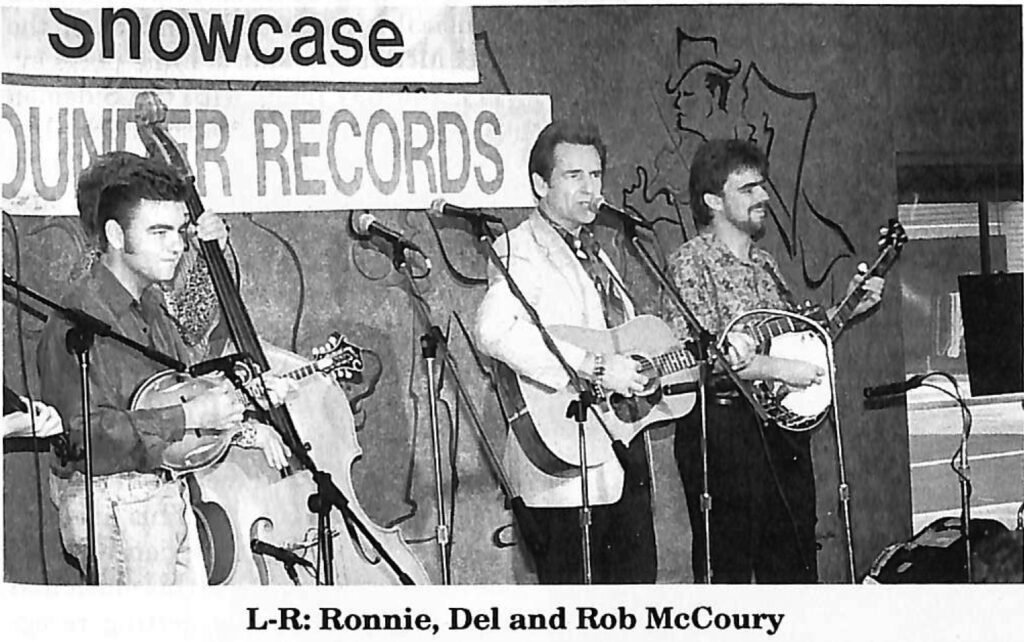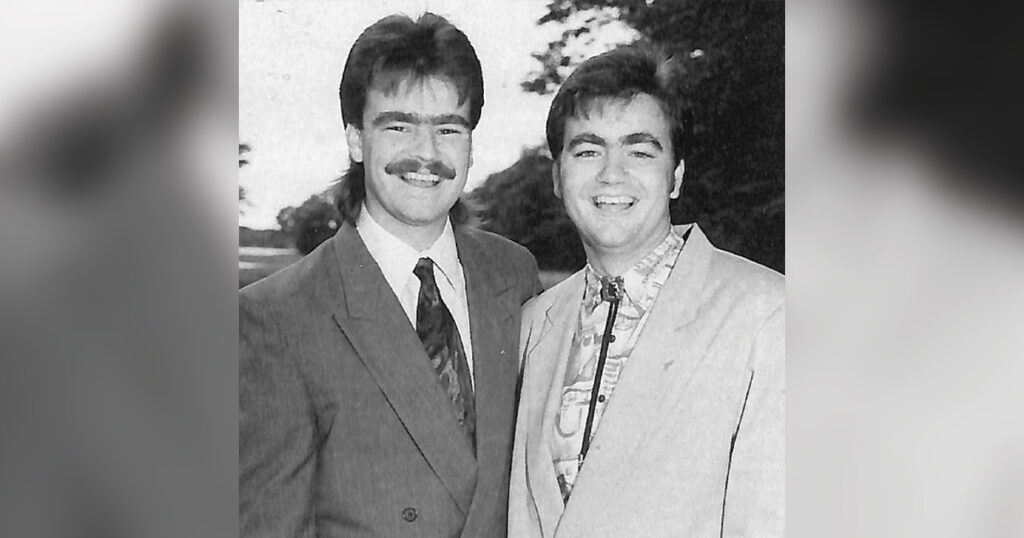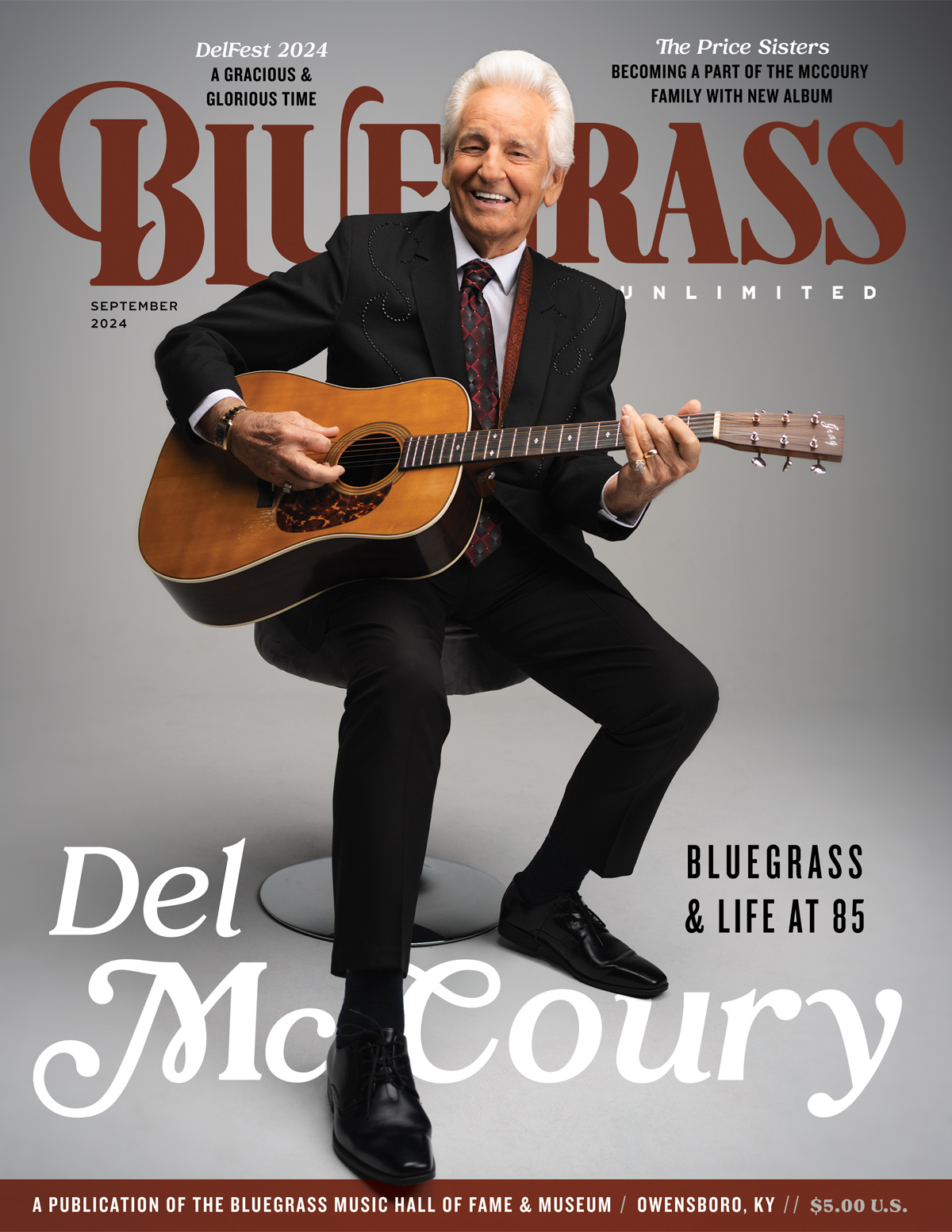Home > Articles > The Archives > Ronnie and Rob McCoury—Sons of Tradition
Ronnie and Rob McCoury—Sons of Tradition
Reprinted from Bluegrass Unlimited Magazine
February 1994, Volume 28, Number 8
The past few years have seen the rise of Del McCoury to the top of the bluegrass world after three decades in the business. Del sounds better than ever, and so does his band. Two of the band members have special reason to enjoy Del’s success: they’re his sons. Ronnie (26) on mandolin and Rob (22) on banjo have become exceptional musicians in their own right who add to Del’s already great sound.
Both these young men have benefited from a life immersed in the music. Growing up with Del McCoury as a father meant listening to bluegrass from a very early age. Most of the other kids in Glen Rock, Pa. were listening to more commercial forms of music. “Our friends don’t know bluegrass from anything. Sometimes they’d make fun of it. I tried to expose them to the music and still keep them as friends!” Ronnie jokingly recalls.
At the same time their friends were exposing them to other forms of music. Rob was partial to southern rock bands such as Lynyrd Skynyrd and the Allman Brothers. Ronnie became a big fan of the Grateful Dead. Ironically, the Dead’s Jerry Garcia would later tell Ronnie that he had been influenced by Del, whom he had seen back in 1963.
Though they listened to other music, both of the boys would time and again return to bluegrass. “Being raised around it I always liked it. It gets hold of people differently. When I hear good bluegrass it makes my hair stand on end—when it’s right there’s nothing better,” says Rob.
When the boys developed an interest in learning to play the music they had a willing teacher in their father. At the age of 13 “I wanted to learn to play the banjo and do a forward roll,” Ronnie remembers. “He showed it to me. Rob (then nine) was sitting there too and he picked up on it.” Ronnie would soon lose interest in the banjo and begin playing the mandolin. “But Rob really took off with the banjo—it seemed to come more naturally for him anyhow.”
Both boys were listening to a lot of bluegrass music and incorporating things they heard into their own playing styles. “Ronnie was listening to a lot of Bill Monroe which I did too” Rob remembers. “He’d get done playing Monroe and I’d put Flatt and Scruggs on and listen to that and try and learn how to play the banjo. I also listened to J.D. Crowe and the New South and the Osborne Brothers all the time. J.D. Crowe, Earl Scruggs and Sonny Osborne—I learned from all of them.”
Ronnie has also been affected by what he’s heard. “I was influenced by Bill Monroe, my Dad, Bobby Osborne, Frank Wakefield—then I got into David Grisman and Sam Bush who are big influences right now. I like Jesse McReynolds’ playing but that’s too hard. Crosspicking’s too hard. All the Dixie Pals who have played mandolin with dad, Dick Staber, Donnie Eldreth, and Herschel Sizemore, I’ve liked their picking. Another influence is Jon Glik’s fiddle playing.”
Ronnie began learning the instrument in December 1980. He probably couldn’t have imagined it then, but it would not be long before he would be joining his father’s band. The Dixie Pals didn’t have a regular mandolin player at the time, and the following May they were playing a show close to Glen Rock. “Dad said, ‘Come on up and play with us.’ I was scared to death. I just chopped the mandolin and played rhythm, I didn’t play any leads,” he remembers. Rob joined the band at the age of 15 as a bass player. A year later he became the regular banjo player.

For a young musician, playing with your father can be rather intimidating. Rob explains, “When I first started I used to wonder about what dad was thinking, does he like this or not. I don’t worry about that much any more, I figure if he didn’t like it he would have told me by now!”
“It’s great standing next to dad,” he continues, “He’s the best rhythm guitar player I’ve ever played with. The current band has got incredible energy. It just psyches you up every time we go on stage. Even if we’re dead tired from travelling, when you get on stage you just forget about it because everybody’s got this great energy.” Ronnie began singing with the band more than four years ago, contributing harmonies and the occasional lead vocal. He sounds uncannily like his father, a fact which he says has its advantages. “It’s great for doing duet singing like the old brother duets that are just about gone.”
Del McCoury’s sound has always been deeply rooted in the traditional side of the music. Ronnie and Rob’s playing reflects these same influences. Both believe understanding and appreciating the traditional roots of the music is important for any bluegrass musician.
“It seems like many of the new bluegrass players don’t understand where the music comes from. The band with Bill Monroe and Flatt and Scruggs, that music is still very exciting to listen to for somebody like Rob and me. That music will never get old to me,” says Ronnie. “And never get better,” Rob adds.
Ronnie believes it’s important for any band to develop an understanding of the music’s roots before going on to develop their own distinctive style. “That’s what bands like the Osborne Brothers did, capturing that traditional sound first. Then when they decided there was nothing more they could do with that they began developing their own singing style featuring their singing and those outstanding vocal trios alongside their picking.”
He points out that many of today’s young players are influenced by a wide variety of other different things. “We were too, but we learned the basics early on. A lot of these people learn different things first then they try to go back and learn the basics but somehow or other they just can’t grasp it. We got it from years of listening to it. My dad always had that hard-driving traditional sound.”
The brothers believe more people would appreciate good bluegrass music if they would only give it a chance. “Most people like to hear a big heavy bass beat and drum beat when they listen to music. They miss the other side of it, the melody and the solos. The heartfelt singing is the soul of bluegrass music. Not too many people really put their soul into it. Good music can be anything, but it has to have soul to it,” explains Ronnie.
He says many people aren’t exposed to good, well-played music. “Even in bluegrass they’re exposed to bands who don’t take their music seriously. We take our music seriously every night. We put everything we’ve got into it. I’ve stood beside dad and every night he puts everything into it and he has every time I’ve ever stood with him. There are a lot of people who just don’t do that. I just don’t understand it.”
All three McCourys moved to Nashville from their native Pennsylvania in early 1992. The move was advantageous for a couple of reasons. Before then, a majority of the band’s bookings had been on the east coast. As their popularity grew they were playing all over the country. Nashville is more centrally located—important for a band that drives to most of their shows.
There was also the advantage of having access to the Nashville Network and its 53 million viewers. “They recently called us and asked us to be on Crook And Chase. TV exposure is the best thing in the world. We just couldn’t do that living up in Pennsylvania” says Ronnie. The appearance on Crook And Chase generated numerous phone calls and letters asking for more information about the band. “If there’s anyway we can get more television, that’s what we want, it’s the only way to go.”
The band has been making the most of opportunities for television exposure. They recently filmed an appearance on TNN’s American Music Shop. They also taped a segment for the new Americana Music Network coming out of Branson, Mo., as well as an appearance on Ronnie Reno’s Old-Time Music Hour for the Nostalgia channel.
Both Ronnie and Rob have pursued musical projects independent of the Del McCoury Band. Ronnie plays every Tuesday night with the Sidemen at the Station Inn in Nashville. He has recorded with Lynn Morris, Gary Ferguson, the Smith Brothers and Larry Perkins among others. Rob has recorded with Ferguson and Perkins also, as well as playing guitar on a couple of cuts with the Bluegrass Band. They are currently working on an album together for Rounder Records.
For both his sons, being with Del as he has risen to the top of his field has been a rewarding experience. “He’s devoted his whole life to this music and he’s only now finally getting recognized for it” says Rob. Ronnie adds “I’ve been with him 12 years including times when he wasn’t as recognized. To come through all those years and see it happen is real special. “Del has reached his peak of popularity in his mid 50s—at a time when many performers are slowing down. “He hasn’t lost a thing, his singing is better than ever and his rhythm playing hasn’t lost a thing,” says Ronnie.
The future is bright for both these young musicians. They may pursue different courses later, but for now they’re happy to play with their father. “I’d like to get my own thing going sometime” says Ronnie, “but for the next few years I’m going to hang in there with dad. I can’t complain, this is the best bluegrass music I’ve ever played, and I’ve played with a lot of people—there’s nobody better to play with in the business right now. Standing next to a professional like dad— that’s what it’s all about.
Doug Fulmer is a freelance journalist in the Baltimore, Md., area. He currently writes for the CLEVELAND PLAIN DEALER, DIRTY LINEN, NEW COUNTRY MUSIC, ACOUSTIC MUSICIAN and BLUEGRASS UNLIMITED

